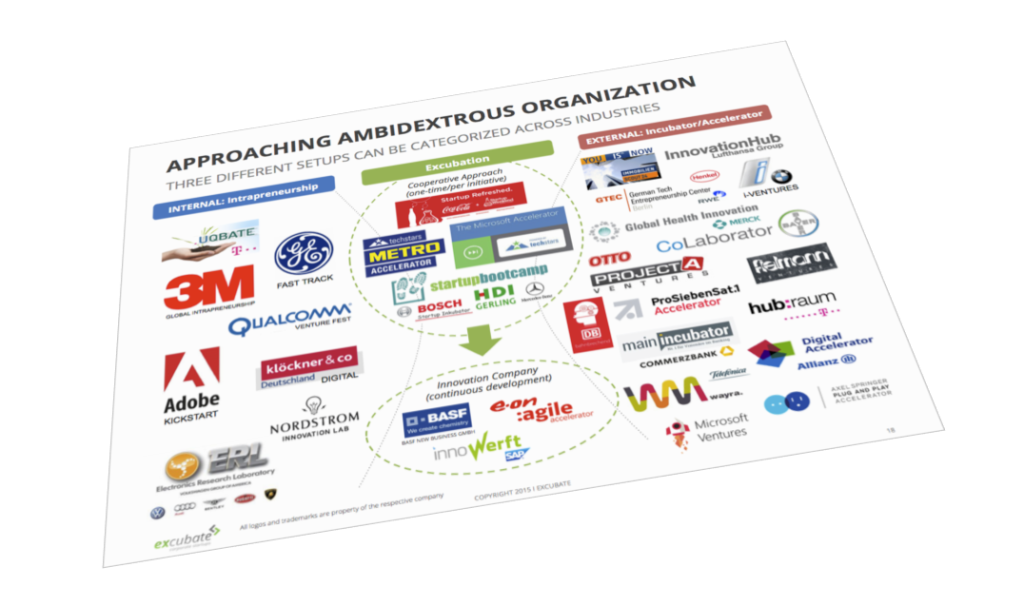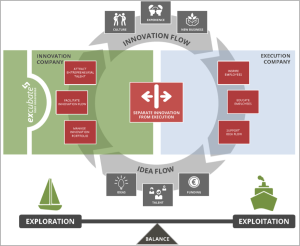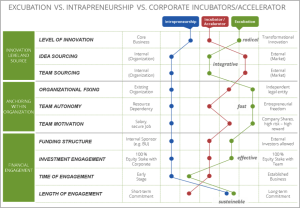- Wednesday, 08.01.25, 11:00 - 12:00 Uhr
- Remote per zoom call,
- Lukas Stratmann
Excubation vs. Incubation
30. Oktober 2015, 11:43 :: Aktuelle Trends | Allgemein
Autor: Victoria Blechman
In unserer Corporate Entrepreneurship Eventreihe präsentieren wir euch seit März monatlich Menschen, die ihre Unternehmen mit Hilfe von neuen Ansätzen zur Innovationsfindung verändern wollen. Tammo Ganders und Markus Anding sind Gründer und Geschäftsführer von excubate. In ihrem Talk am 10. November werden sie ihre Erkenntnisse aus der Zusammenarbeit mit Corporates präsentieren. In diesem Blogbeitrag schildern sie, welche Erfahrungen sie bisher gemacht haben.
Infos und die Tickets zum Talk am 10. November gibt es hier.
Seit einigen Jahren gehören Corporate Entrepreneurship Initiativen wie Incubators, Accelerators oder Intrapreneurship-Programme in deutschen Großunternehmen zum Standard-Repertoire ihrer Innovationsaktivitäten. Leider mit mäßigem Erfolg. Die meisten Vorhaben bleiben weit hinter den Erwartungen zurück oder verkommen zur PR-Show. Der neue Ansatz namens „Excubation“ verspricht Abhilfe, damit Corporates nicht nur „like-a-startup“ innovieren lernen, sondern ihre Stärken gezielt mit den Vorteilen der Startup-Welt bündeln können.
Excubation follows the paradigm of separating exploration from exploitation to the right extent (not too much, not too little) to enable corporate ventures flourish without being hindered by existing corporate processes and conventions. Seven excubate rules define exactly how the execution company and the innovation company should operate for innovations to be most successful (for a detailed discussion of these – please click here).
The critical element we propagate at excubate is the recurring idea and innovation flow between execution and innovation entities. This ensures not only the innovation entity being sufficiently supported with resources, but more importantly a certain part of the execution DNA being incorporated into new ventures which makes it much easier to re-integrate once it took off. This is the biggest challenge for most other approaches and more often than not results in a pure financial engagement in a startup firm.
To establish an excubation organization you don’t need to create and significantly fund a new legal entity right away. A first excubation pilot project to create and establish a first innovative product or business model running the process “like a startup” will help gain experience and build a repeatable model over the mid-term. This can then eventually lead to a separate entity to excubate new businesses in a recurring way.
excubation vs. other means of corporate entrepreneurship
Separating corporate entrepreneurship activities too much or too little from the core business has been proven to be one major hurdle for innovation success. Current approaches like intrapreneurship programs, corporate incubators or accelerators have been failing because of exactly this reason: Stalled and suffocated by the core business or starved as an external startup that couldn’t be integrated because of culture and process divergence.
We have screened a wide variety of companies and respective innovation approaches and collected a set of examples and showcases*. While there isn’t a clear pattern of companies running either approach, we’ve observed, directionally, that the more traditional innovators (GE, 3M, Nordstrom, even tech companies like Qualcomm and Adobe) tend to experiment with intrapreneurship models, while smaller companies and players with less history in traditional innovation (Otto Group, ProsiebenSat1, Commerzbank, Bayer) often run accelerator programs.
Excubation on the contrary tries to find a better balance along a set of key parameters, which we have grouped into “Innovation level and source”, “Anchoring within the organization” and “Financial engagement”.
Excubation takes a more balanced approach to the sourcing of teams and ideas, leveraging internal and external resources synergetically. Regarding anchoring, a more aggressive approach is proposed with high level of independence and decision authority with the startup team- different from what we found in intrapreneurship and incubator approaches. Looking at examples*, we find companies like Microsoft Techstars, BASF, SAP (Innowerft) and eon already running excubation-like approaches. Some have even already set up own innovation companies for recurring excubation.
Weitere Informationen gibt es hier: http://explained.excubate.de
Infos und die Tickets zum Talk am 10. November gibt es hier.
innovate@excubate.de // www.excubate.de // Autoren: Dr. Markus Anding and Tammo Ganders, MBA
Kommende Events
- Thursday, 09.01.25, 09:30 - 11:30 Uhr
- STARTPLATZ, Speditionstraße 15A, 40221 Düsseldorf
- Friday, 10.01.25, 12:00 - 13:00 Uhr
- Remote per zoom call,
- Lorenz Gräf










